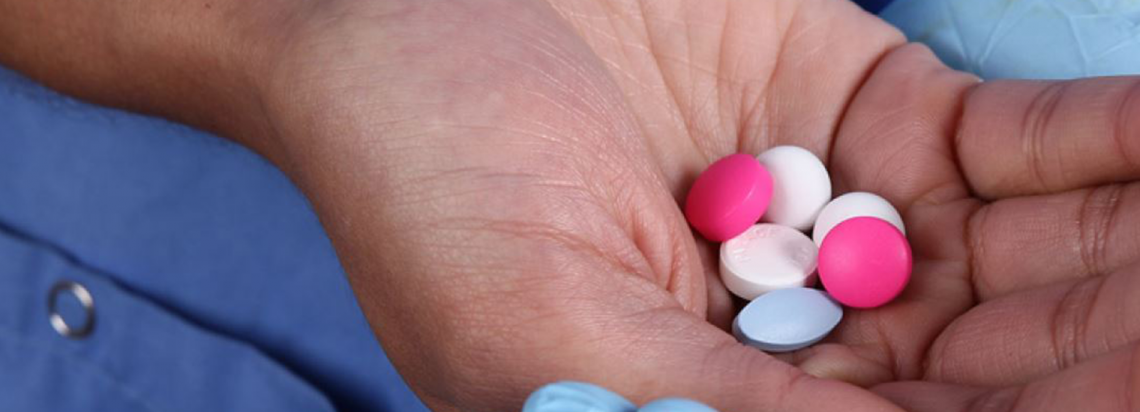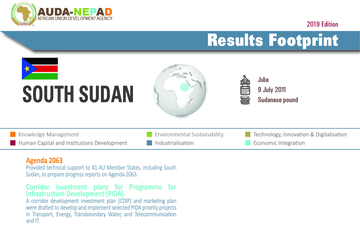 South Sudan
South Sudan
Official Name: Rebpublic of South Sudan
Capital: Juba
Independence Day: 9 July 2011
Currency: Sudanese pound
Key Result
The Sudan Peace and Education Development Programme (SPEDP) facilitated the empowerment of 600 women in the Morobo and Magwi counties, through modern organic vegetable and fruit production techniques. Furthermore, the female farmers received seeds, water tanks, fertilisers and farming equipment. Additionally, training was provided to the beneficiaries on post-harvest handling and management.
In 2015, the inaugural IGAD Member States NMRA’s meeting was held in Addis Ababa, Ethiopia. South Sudan successfully participated and signed the Call for Action to implement a regional Medicines Regulatory Harmonization (MRH) programme.
Juba Torit Kapoeta Nadapal Eldoret Road Project (DFS) aims to enhance interstate and regional connectivity, through upgrading a priority road section along a critical national and international corridor. The proposed project contributes to the overarching goal of integrating South Sudan to the regional markets and supporting the newly independent African State to function as a nation.
South Sudan received technical support from the NEPAD Agency to develop its draft CAADP Compact and Agriculture Investment Plan.
Related
Projects

A critical AU Model Law aimed at harmonizing medical products regulatory systems in Africa was endorsed by African Heads of State and Government at the January 2016 AU Summit in Addis Ababa, Ethiopia. The AU Model Law will contribute towards accelerate the regulation of safe, quality and affordable medical products and technologies in South Sudan.
In 2015, the inaugural IGAD Member States NMRA’s meeting was held in Addis Ababa, Ethiopia. South Sudan successfully participated and signed the Call for Action to implement a regional Medicines Regulatory Harmonization (MRH) programme. A follow up meeting was convened in 2016 and agreed to establish an IGAD MRH Steering Committee, Technical Working Groups (TWG’s) and a Coordination Unit.

South Sudan received technical support from the NEPAD Agency to develop its draft CAADP Compact and has advanced in the development of the Agriculture Investment Plan.

Project : North–South Power Transmission Corridor
Sector : Energy
Description : 8,000 km line from Egypt through Sudan, South Sudan, Ethiopia, Kenya, Malawi, Mozambique, Zambia, Zimbabwe to South Africa
Countries : Egypt, Sudan, South Sudan, Ethiopia, Kenya, Tanzania, Malawi, Mozambique, Zambia, Zimbabwe, South Africa
RECs : COMESA/EAC/ SADC/IGAD
Project : Northern Multimodal Corridor
Sector : Transport
Description : This programme is designed to modernize the highest priority multimodal ARTIN corridor on modern standards (climbing lanes and urban bypasses) in East Africa. This programme aims to facilitate travel by people and goods across the borders between Kenya, Uganda, Rwanda, Burundi and DRC with a spur to South Sudan
Countries : Kenya, Uganda, Rwanda, Burundi, DRC, South Sudan
RECs : COMESA/EAC
Project : Juba Torit Kapoeta Nadapal Eldoret Road Project (DFS)
Sector : Transport
Description : Enhance interstate and regional connectivity, through upgrading a priority road section
along a critical national and international corridor. The proposed project contributes to
the overarching goal of integrating South Sudan to the regional markets and supporting
the newly independent African State to function as a nation.
Countries : South Sudan
RECs : IGAD, EAC
Project : TAH programme
Description : This is phase I of the continental connectivity programme that focuses on completion and standardisation of the TAH missing links by 2030
Project : Single African Sky phase 1 (design and initial implementation)
Description : Single African Sky is a continental programme that will create a high-level, satellite-based air navigation system for the African continent
Project : Yamoussoukro Decision implementation
Description : Accelerate Yamoussoukro Decision implementation by identifying countries that are ready to fully implement it, and discussing and agreeing with both their governments and airlines to launch the voluntary club on a full membership basis;
Project : ICT Enabling Environment
Description : This programme would improve the environment for the private sectors to invest in high-speed broadband infrastructure
Project : ICT Terrestrial for Connectivity
Description : This programme has two main components: secure each country connection by at least two broadband infrastructure and ensure the access to submarine cable to all landlocked countries
Project : Internet Exchange Point (IXP) programme
Description : The aim of this programme is to provide Africa with adequate internet node exchange to maximise internal traffic
Project : North–South Power Transmission Corridor
Description : 8,000 km line from Egypt through Sudan, South Sudan, Ethiopia, Kenya, Malawi, Mozambique, Zambia, Zimbabwe to South Africa
Project : Northern Multimodal Corridor
Description : This programme is designed to modernize the highest priority multimodal ARTIN corridor on modern standards (climbing lanes and urban bypasses) in East Africa. This programme aims to facilitate travel by people and goods across the borders between Kenya, Uganda, Rwanda,
Burundi and DRC with a spur to South Sudan
Project : Juba Torit Kapoeta Nadapal Eldoret Road Project (DFS)
Description : Enhance interstate and regional connectivity, through upgrading a priority road section along a critical national and international corridor. The proposed project contributes to the overarching goal of integrating South Sudan to the regional markets and supporting the newly independent African State to function as a nation.
Results:
•359 291 women capacitated through CSO and grassroots organizations including 92 Local authorities and state government in the six geopolitical zone of Nigeria. Namibia 13 Council has implemented Action Plan for Gender Aware Service Delivery and 384 Parliamentarian in the region of Tigray, Amhara and Somalia facilitated research support from 250 graduated students for Gender Aware Parliamentarian Oversight.
•74 435 women empowered economic and financial terms: Income generation skills; Deployment of technical assistance to boost agriculture production for both consumption and commercial purposes; Accessing agricultural extension services; Promotion of gender inclusiveness in decision making; Creation of enabling environment to access land; Land tenure and legalization of land title for women; Youth job creation; SME management; Informal and Regional Trade development.
•25 438 women support through institutional based capacity building.

ASTI has captured comprehensive information on STI and consequently built in-country capacity to collect, analyse & publish data and information on research & development (R&D) and Innovation

Results (2013 – 2015)
Advocacy and Strengthening of Negotiation Capacities on Post-2015 Development Agenda through the Common African Position (CAP):
• The multi-stakeholder framework of engagement specifically enhanced dialogue towards ensuring the required mass to influence the Post-2015 Global Agenda and Development Goals relevant to the Continent;
• This intervention helped strengthen country and regional level negotiating capacities for the effective incorporation and articulation of Africa’s priorities as enshrined in CAP in the final Global SDGs;
• The project enabled the participation of African stakeholders at the Means of Implementation Engagement, 3rd Financing for Development Conference and the UN General Assembly that adopted the new SDGs. This ensured the incorporation of Africa’s development priorities into the new goals through developing essential negotiation capacities;
• Through the CAP/SDGs space on the Africa Platform for Development Effectiveness (APDev), knowledge products and negotiation documents, as well as, policy briefs where successfully disseminated to the African negotiators in New York and kept the continent’s stakeholders informed of the overall process;
• Development and dissemination of post-2015 Policy Briefs on “Financing and Partnerships” and “Structural Economic Transformation and Inclusive Growth”. These are priorities outlined in the CAP and the policy briefs where utilized in the negotiation process for the African continent.
Global Partnership for Effective Development Cooperation (GPEDC):
• Africa secured the hosting of the 2nd High Level Meeting (HLM) of the Global Partnership. This was attained through robust negotiation and facilitating a common voice from Africa with regards to this critical engagement by the NEPAD Agency. The 2nd HLM will be held in Nairobi Kenya;
• The NEPAD Agency advocated for the full inclusion and participation of Africa’s Regional Economic Communities (RECs) in conducting the 2nd GP Monitoring Exercise. This was a fundamental achievement considering the RECs are the continent’s building blocks with regards to socio-economic transformation;
• The Africa Action Plan on Development Effectiveness (AAP) was granted the status of an official Global Partnership Initiative (GPI) at the Planning Meeting in Brussels. The AAP was developed by the NEPAD Agency in consultation with African multi stakeholders. This has enabled the Agency to successfully mobilize resources towards the implementation of the AAP.

Project : Transmission-- North South Transmission Line Project
Countries/Region : Egypt, Sudan, South Sudan, Ethiopia, Kenya, Uganda, Tanzania, Malawi,Mozambique, Zambia, Zimbabwe, South Africa, | East and Southern Africa
Project Location : Regional Interconnector-East and Southern Africa
Sector/Subsector : Energy/Transmission
Project Description : Construction of an 8,000 km, 3,000 - 17,000 MW capacity transmission line system from Egypt through Sudan, South Sudan, Ethiopia, Kenya, Uganda, Tanzania, Malawi, Mozambique, Zambia, and Zimbabwe to South Africa, connecting the Eastern Africa Power Pool (EAPP) and the SAPP.

Project : North-South Corridor Road/Rail Project
Description : Construction of a multi-modal trans-continental interconnector
Description : The use of political gravitas and goodwill to unblock and facilitate political bottlenecks affecting the implementation of ICT broadband and optic fibre projects on the continent

At the beginning of 2014, 37 of the 42 opted-in African countries have completed a rapid assessment / gap analysis. The next step for countries is to develop a SE4LL Action Agenda and Investment Prospectus(es). To support this process, the SE4ALL Africa Hub partners have led the development of Africa Guidelines for SE4ALL national Action Agendas. The Africa Guidelines lay out principles and process for developing Action Agendas and put forward a balanced approach of centralized and decentralized solutions to achieve universal access to energy services.
Progress in South Sudan:
Joined SE4All initiative"
you agree to the AUDA-NEPAD Privacy Policy.


